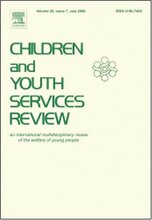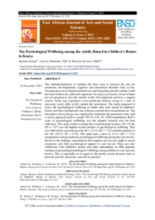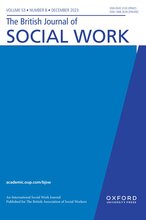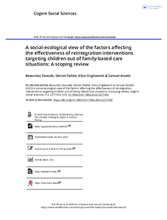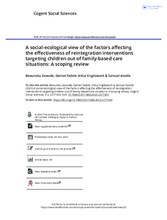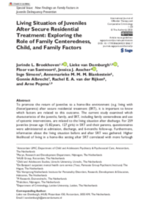Displaying 51 - 60 of 991
This article analyzes the integration process of children returned from ISIS territory in three regions of the Russian North Caucasus from where the largest number of ISIS fighters with Russian citizenship originated. Following the concepts of “reintegration of returned migrants” and “cultural citizenship”, it explicates the role of key actors in the processes of adaptation and integration of children and their families, as well as analyzes the nature of the barriers they overcome to restore their lost civil status and identity.
Case management is used with both families at risk of separation and those where children have already separated and are in the process of being reintegrated, including biological family or placed into an alternative family (e.g., foster or kinship). The end goal of case management is that children are safe and nurtured within a family that is able to care for them, and access needed services that address risks and increase resilience.
Family strengthening is comprehensive strengths-based approaches, supports and services to families at risk of separation or those receiving
This study purposed to assess the psychological wellbeing of adults who were raised in children’s homes and other institutional care in Kenya and had since transitioned out. T
This article uses life history research to reveal a new understanding of institutional care. The study draws on interviews with care leavers from a Latvian orphanage who narrate life histories and identify critical life events and moments of resistance to times of adversity.
The purpose of this review was to describe in more detail the findings and range of research undertaken regarding the reintegration of children out of family-based care situations, thereby providing a mechanism for summarizing and disseminating research findings to policy makers, practitioners, and researchers who might otherwise lack time or resources to undertake such works themselves. The review has been undertaken with the motive of answering the question
of what is known from the existing empirical literature about the effectiveness and challenges of intervention programs that are meant to sustainably reintegrate children out of family-based care?
This scoping review aimed to identify the factors affecting the effectiveness of reintegration interventions targeting children outside family-based care. It aims to provide service providers with concise evidence regarding the situations affecting the effectiveness of reintegrating vulnerable children into the community by reviewing the relevant empirical evidence. Unlike other related reviews that have dealt with reintegration practices in selected regions or a specific country alone the present study considered research undertaken in all regions of the world.
To promote the return of juveniles to a home-like environment (e.g. living with (foster)parents) after secure residential treatment (SRT), it is important to know which factors are related to this outcome. The current study, based in the Netherlands, examined which characteristics of the juvenile, family, and SRT, including family centeredness and use of systemic interventions, are related to the living situation after discharge.
Tiegan Boyens, ATD Fourth World and Teen Advocacy
Tiegan Boyens, of ATD Fourth World and Teen Advocacy, shares about the importance of staying connected to birth family as an adoptee as well as maintaining other connections such as friendships made throughout childhood.

